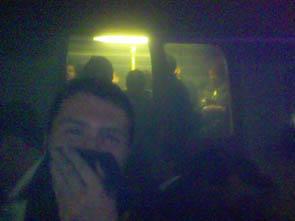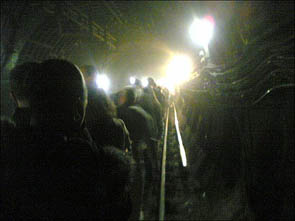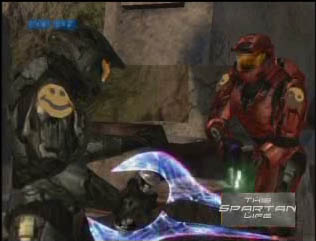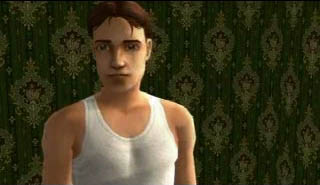
Spam Poem: For Paul Graham. William Poundstone’s found poetry contructed from spam.

Audio Diary: A Rocky Freedom. Found poem constructed from sound bites; created during the “second” Iraq war.

Acronymphomania uses processes of random dynamic motion and text generation to suggest the continuing qualitive changes in the speed of our society
Monthly Archives: July 2005
the tipping point for citizen journalism?
We are fast approaching a point when there will be as many cameras as there are points of view. Everyone is an eye with a record button – embedded, as it were, in the trenches of everyday life. In the week that has passed since the bombs rocked London, major newspapers and television networks have run images and grainy video clips captured by ordinary people on their cellphones and digital cameras. Flickr has become a clearinghouse for July 7 terror blast images. Technorati has tracked the commentary and condolences that have flowed through the blogosphere. The Wikipedia community has mounted a detailed page, through thousands of edits, that combines the most up-to-date developments of the news with the useful contextual evidence and historical background that one would expect from an encyclopedia. But it’s the images and video that have made the greatest penetration into the mainstream media. From “London Bombing Pictures Mark New Role for Camera Phones” in National Geographic News:
The BBC said it received around 30 video clips from members of the public and more than 300 e-mails containing an average of three images each on the day of the attacks. TV news channels, meanwhile, aired cell phone video footage within half an hour of the explosions.
These are probably the two most reproduced images:


From a column in Digital Journalist on “citizen shutterbugs”:
Many times these images are sent to family members first and then later find their way into the river of data that becomes public information. At times, some of these images are “picked up” by the mainstream media and disseminated as “real” news, which of course they can be.
The same goes for the photos from Abu Ghraib, first distributed among friends as perverse trophies from the land of occupation. I wonder about this impulse to record one’s life in such fine-grained detail – it seems the new technologies turn us into auto-voyeurs. The soldiers record their crimes and end up implicating themselves. Similarly, the victims of the London bombings record their evacuation march through the tunnels, bearing witness to their own trauma. Then there are the onlookers, the passersby, who happen to be near the chaos.
Were the London bombings the tipping point? A local news cameraman meditates on the imminent decline of his profession:
Now, a new revolution is about to be televised. Tiny lenses are popping in the most unlikely of devices, powerful editing is just a laptop away and personal websites are racing towards critical mass. How long before my oversized fancy-cam looks like an early 80’s bag phone? About the same time the six o clock news begins looking like it was shot by a hopped-up junkie with a twitchy digital, I’m guessing. The next ten years promise to feature a rapid breakdown of my chosen craft. Whatever new paradigm takes hold, it’s a safe bet the two-person news crew is an endangered species, driven to oblivion by technology and methods that are faster and cheaper, but not necessarily better. Hopefully by that time, I’ll have found more fulfilling ways to make a difference and a paycheck. Until then, I’ll be here in the media pack, one eye buried in a viewfinder, the other one keeping steady watch over a nation of digital interlopers.
Other relevant items:
From Newsweek: “History’s New First Draft”
From the BBC: “Mobiles Capture Blast Aftermath”
walking around inside a book – bob’s interview in halo space
 A couple of months ago, Bob did a rather unusual interview for This Spartan Life, a new online talk show set in the world of Halo video game series. I just received word that the first episode is now up. The show is hosted by Damian Lacedaemion, a hulking, bionic warrior sporting a thousand pounds of body armor, a visored helmet, and what looks like an enormous, ion-charged hair clip. Ordinarily, this character would be blazing his way through an interplanetary battle zone, but here, he’s chatting it up with Bob (also represented by a fearsome armor-plated commando) about the future of books. The effect is truly bizarre.
A couple of months ago, Bob did a rather unusual interview for This Spartan Life, a new online talk show set in the world of Halo video game series. I just received word that the first episode is now up. The show is hosted by Damian Lacedaemion, a hulking, bionic warrior sporting a thousand pounds of body armor, a visored helmet, and what looks like an enormous, ion-charged hair clip. Ordinarily, this character would be blazing his way through an interplanetary battle zone, but here, he’s chatting it up with Bob (also represented by a fearsome armor-plated commando) about the future of books. The effect is truly bizarre.
The show was taped in a studio, with Bob and Damian (played by director Chris Burke), controllers in hand, seated in front of an Xbox console. Totally abandoning the story line of the game, the two avatars move through the surreal landscape – part derelict Soviet steel mill, part remote desert island – as though simply going for a stroll in the park. All their meanderings are recorded through a video feed and edited later on. Periodically, the conversation is interrupted by unfriendly fire from other online gamers unaware that a more civil interaction is taking place in the forbidding combat terrain. Damian has to deal with these intrusions, casually lobbing a grenade mid-sentence, or swooping across several hundred yards of game space to decapitate an assailant, swooping back to catch the end of Bob’s remark. It’s quite entertaining: the incongruousness of the conversation within the alien landscape of the game, the sudden bursts of violence. It reminds me a bit of Space Ghost Coast to Coast, which turned an old Hanna Barbera cartoon character into a talk show host with real celebrity guests. In the case of Spartan Life, there’s something weirdly logical about placing a conceptual conversation about the future in the future. A nice expressionistic touch.
 The show fits into a recently emerged genre of films set in video game environments, known as “Machinima.” Most of the Machinima films I’ve seen are best described as surreal sitcoms – short episodes commenting on the inherent strangeness of video game worlds. The characters are often in the midst of existential crisis, asking “what am I doing here?” Like certain other genres (say, musicals), video games can appear comically absurd by adding just a small dose of reality. So far, Machinima has played in this territory, floating banal chit chat into the hyper-violent game worlds, finding humor in juxtaposition. Other games, like the Sims, offer their own possibilities for comical remixing. It’ll be interesting to see if the genre matures beyond this. By conducting real interviews, often with people unfamiliar with the game environment, This Spartan Life introduces a nice element of surprise.
The show fits into a recently emerged genre of films set in video game environments, known as “Machinima.” Most of the Machinima films I’ve seen are best described as surreal sitcoms – short episodes commenting on the inherent strangeness of video game worlds. The characters are often in the midst of existential crisis, asking “what am I doing here?” Like certain other genres (say, musicals), video games can appear comically absurd by adding just a small dose of reality. So far, Machinima has played in this territory, floating banal chit chat into the hyper-violent game worlds, finding humor in juxtaposition. Other games, like the Sims, offer their own possibilities for comical remixing. It’ll be interesting to see if the genre matures beyond this. By conducting real interviews, often with people unfamiliar with the game environment, This Spartan Life introduces a nice element of surprise.
It’s hard for us more traditional readers to grapple with the significance of video games. During the interview, Bob muses about what it will be like to walk around inside a book. What if other readers are interrupting or joining in the story you are reading? I grew up playing linear 2-D games like Super Mario Bros. and Castlevania. By the time the next generation of game systems was hitting the market with their new immersive 3-D narratives, my gaming habit had tapered off. But increasingly, kids are growing up with the expectation that narrative worlds (like books) will be interactive, multidirectional, and almost hallucinogenically real. There is the familiar complaint that younger generations have short attention spans, but the evidence offered by gaming suggests the opposite. While many kids may indeed have short attention spans for traditional media like books and certain kinds of films, they are perfectly capable of spending long stretches of time in complex game environments that combine stories with problem and puzzle solving, and that allow them to engage with peers within the game space. This is territory explored by Steven Johnson’s new book, which I have yet to pick up. But I’ll end with an amusing quote from his blog that I posted back in April when the book was coming out. It imagines what might have been society’s response if video games were in fact the older invention and books the dangerous new toy.
Reading books chronically under-stimulates the senses. Unlike the longstanding tradition of gameplaying–which engages the child in a vivid, three-dimensional world filled with moving images and musical soundscapes, navigated and controlled with complex muscular movements–books are simply a barren string of words on the page. Only a small portion of the brain devoted to processing written language is activated during reading, while games engage the full range of the sensory and motor cortices.
Books are also tragically isolating. While games have for many years engaged the young in complex social relationships with their peers, building and exploring worlds together, books force the child to sequester him or herself in a quiet space, shut off from interaction with other children. These new ‘libraries’ that have arisen in recent years to facilitate reading activities are a frightening sight: dozens of young children, normally so vivacious and socially interactive, sitting alone in cubicles, reading silently, oblivious to their peers.
Many children enjoy reading books, of course, and no doubt some of the flights of fancy conveyed by reading have their escapist merits. But for a sizable percentage of the population, books are downright discriminatory. The reading craze of recent years cruelly taunts the 10 million Americans who suffer from dyslexia–a condition didn’t even exist as a condition until printed text came along to stigmatize its sufferers.
But perhaps the most dangerous property of these books is the fact that they follow a fixed linear path. You can’t control their narratives in any fashion–you simply sit back and have the story dictated to you. For those of us raised on interactive narratives, this property may seem astonishing. Why would anyone want to embark on an adventure utterly choreographed by another person? But today’s generation embarks on such adventures millions of times a day. This risks instilling a general passivity in our children, making them feel as though they’re powerless to change their circumstances. Reading is not an active, participatory process; it’s a submissive one. The book readers of the younger generation are learning to ‘follow the plot’ instead of learning to lead.
report to congress: johnny can’t write
The National Commission on Writing released its third report to Congress on Tuesday. It quantifies just how much poor writing skills are costing taxpayers. According to the report many state employees must undergo remedial training in order to bring their writing skills up to state expectations. This training costs taxpayers $250 million a year and that does not include the incalculable cost of lost productivity. This report was part of an ongoing evaluation of our nation’s writing skills. The Commission’s first report to Congress, The Neglected “R”, called for improvements in writing education. Its second report, Writing: A Ticket to Work…Or a Ticket Out, A Survey of Business Leaders, examined the impact of poor writing skills on the private sector.
What does all this mean for the future of the book? Emerging technologies get a lot of air time on this blog, but very little has been said about writing itself. Clearly poor skills will have a negative impact on the future book, but what role, if any, are electronic technologies playing in the deterioration of writing? Certainly our reading behaviors are changing (see featured thread) but what of our writing?
the book has been dead for a long time
“The newspaper kills the book, as the book has killed architecture, and as artillery has killed courage and muscular strength. We are not aware of what pleasures newspapers deprive us. They rob everything of its virginity; owing to them we can have nothing of our own, and cannot possess a book all to ourselves; they rob you of surprise at the theatre, and tell you all the catastrophes beforehand; they take away from you the pleasure of tattling, chattering, gossiping and slandering, of composing a piece of news or hawking a true one for a week through all the drawing-rooms of society. They intone their ready-made judgments to us, whether we want them or not, and prepossess us against things that we should like; it is owing to them that the dealers in phosphorus boxes, if only they have a little memory, chatter about literature as nonsensically as country Academicians; it is also owing to them that all day long, instead of artless ideas or individual stupidity, we hear half-digested scraps of newspaper which resemble omelettes raw on one side and burnt on the other, and that we are pitilessly surfeited with news two or three hours old and already known to infants at the breast; brandy drinkers and file and rasp swallowers, who have ceased to find any flavour in the most generous wines, and cannot apprehend their flowery and fragrant bouquet.”
(from Theophile Gautier’s preface to Mademoiselle de Maupin, May 1834)
the internet public library turns ten
The Internet Public Library was created in 1995 by a group of graduate students led by Prof. Joseph James at the University of Michigan to “ask interesting and important questions about interconnections of libraries, librarians, and librarianship with a distributed networked environment.”
Over the last ten years, the IPL has expanded their mission to create a public service organization and a learning/teaching environment. According to a 2003 press release:
Through the IPL, librarians and library students learn to integrate the use of the Internet into their professional practice. Internet users get help in navigating the sea of information on the Internet in order to find information they actually need and can use. By training librarians, students, and to some extent users, in using, searching, and evaluating the Internet, the IPL improves information literacy, a much-needed skill in the 21st century. Librarians and library students learn from IPL’s examples, thus relieving them of the need to constantly “reinvent the wheel.” Internet users spend less time wading through garbage and more time getting their real work done.
the grokster decision
The Supreme Court’s MGM v. Grokster ruling came and went without comment from if:book (we miss you Ben). When I heard about the decision, I told myself: Kim, you should write a post about that. But my only thought on the subject was, So what? The ruling can’t stop the change that is underway. Then I ran across this marvelous William Gibson quote: “We legislate after the fact, in a perpetual game of catch-up, as best we can, while our new technologies redefine us.” That’s from a recent article in Wired entitled “God’s Little Toys: Confessions of a cut & paste artist” He also had this to say about the record industry:
Today, an endless, recombinant, and fundamentally social process generates countless hours of creative product (another antique term?). To say that this poses a threat to the record industry is simply comic. The record industry, though it may not know it yet, has gone the way of the record. Instead, the recombinant (the bootleg, the remix, the mash-up) has become the characteristic pivot at the turn of our two centuries.
My sentiments exactly.
